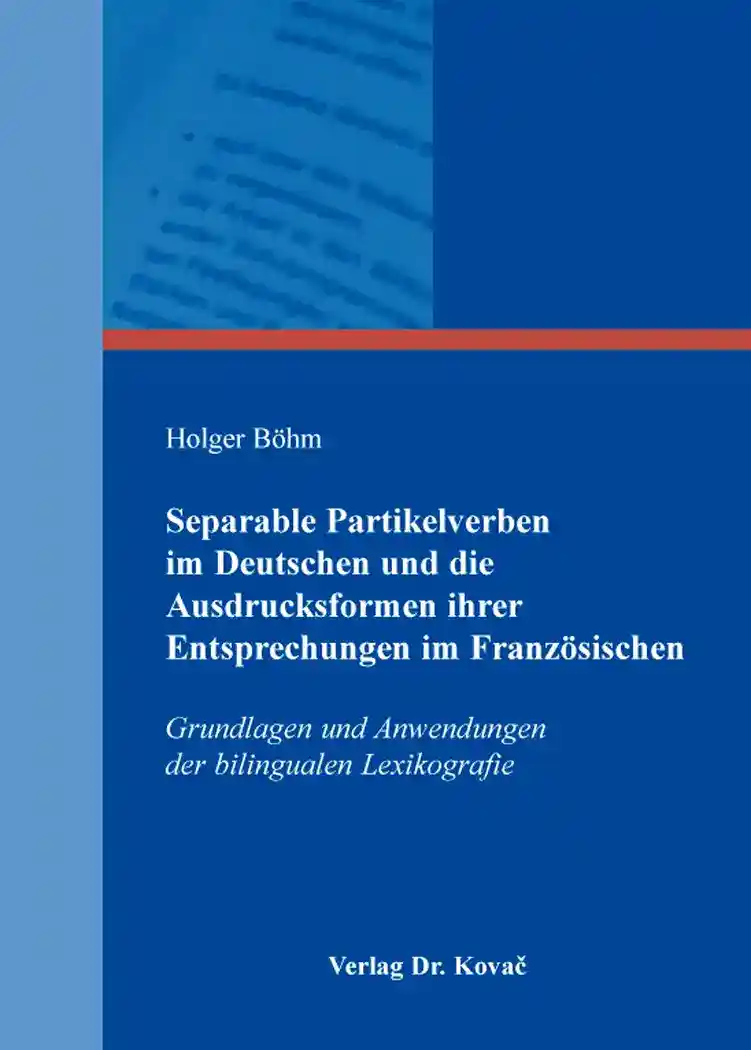Holger BöhmSeparable Partikelverben im Deutschen und die Ausdrucksformen ihrer Entsprechungen im Französischen
Grundlagen und Anwendungen der bilingualen Lexikografie
PHILOLOGIA – Sprachwissenschaftliche Forschungsergebnisse, volume 196
Hamburg 2015, 256 pages
ISBN 978-3-8300-8142-5 (print) |ISBN 978-3-339-08142-1 (eBook)
About this book deutschenglish
Separable particle verbs are a very widespread type of component verb in German. Their particular feature is that they are separable in specific syntactic structures. The particle, i.e., the first part of the verb, is often a preposition or a similar word which is separated from the verb's stem to be added only at the end of the sentence. Separable particle verbs also behave differently from other verbs when forming past participles and infinitives with "zu". But this group of compound verbs does not only deserve attention for this reason alone. It is one of the most productive groups of words in the contemporary German language and is also widespread in technical languages. But particular grammatical features make it difficult for learners of German as a foreign language to master this language phenomenon. And this is particularly true when such a type of verb does not exist in a learner's mother tongue. In French, for instance, you do not have any separable verb and this can lead to difficulties in translation from time to time. This thesis endeavours to answer the question whether there are certain patterns and regular features when translating separable German particle verbs into French. Comparing these two languages in this way is a new approach and allows conclusions on how sentences from a language having a particle system need to be transposed in a language without a particle system. Many examples, also from texts, are given to illustrate investigation results and show the various opportunities available in practice. This comparison does not only cover simple particle verbs and their French counterparts but also so-called complex predicate expressions whose components include a particle verb as, e.g., structures consisting of a separable particle verb and an adverb. The theoretical basis for these explanations is provided by the lexicon grammar of Maurice Gross and others. For this reason, its assumptions and working methods are also presented in a straightforward and concise compilation. In addition, this book makes proposals for improving the structure of lexicon entries based on the results obtained. It presents different variants both for bilingual learning dictionaries and for electronic lexicons. Practical exercises for learners of German as a foreign language are presented to round off this book.Keywords
Allgemeine SprachwissenschaftBilinguale LexikografieLexikongrammatikNominale PrädikatePrädikative KonstruktionenPrädikatsausdrückeSemantische KlassenSeparable PartikelverbenStrukturierung von LexikoneinträgenÜbersetzungsvariantenVerb-Adverb-KonstruktionenVerb-Nomen-KonstruktionenVerwendung von PrädikatsausdrückenIhr Werk im Verlag Dr. Kovač

Möchten Sie Ihre wissenschaftliche Arbeit publizieren? Erfahren Sie mehr über unsere günstigen Konditionen und unseren Service für Autorinnen und Autoren.
